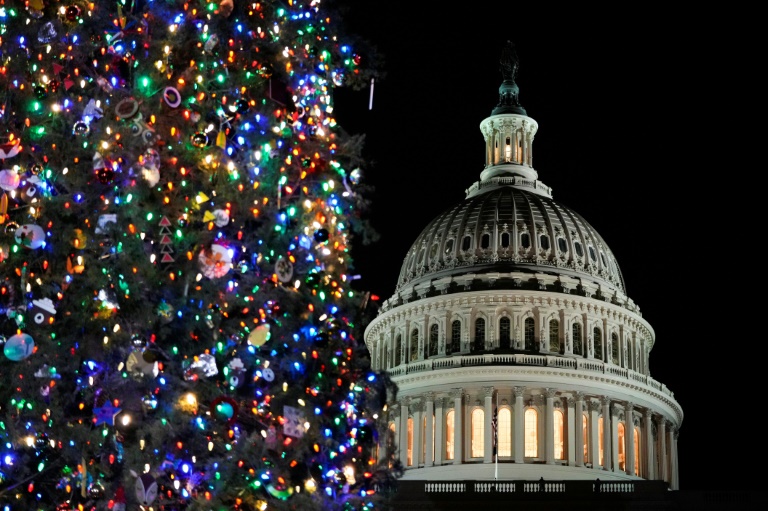The US House of Representatives voted Thursday to keep federal agencies running for another 11 weeks and avoid a costly holiday-season government shutdown — although the stopgap measure faces a thorny path in the Senate.
With the cash due to dry up after 11:59 pm Friday, the Democratic-controlled lower chamber passed temporary legislation to keep the lights on until February 18.
The “continuing resolution” would avoid millions of public workers being sent home unpaid with Christmas approaching, as parks, museums and other federal properties and services closed.
But a small group of hardline Republicans is threatening to slow down the measure in the Senate in protest over the White House’s pandemic response, meaning the closure remains a very real possibility.
They say they won’t back down unless Democrats agree to a straight majority vote on defunding President Joe Biden’s vaccine-or-testing mandate for large companies.
The right-wing Republican group, which may amount to as little as two or three senators, argues that the mandate is an assault on personal liberty.
Only a single House Republican — anti-Trump congressman Adam Kinzinger — voted for Thursday’s stopgap, which passed by 221 votes to 212.
In theory the measure would buy legislators time to negotiate full-year spending bills for the rest of fiscal 2022.
But it would need the support of every Republican in the 50-50 Senate to bypass the normal, days-long procedure needed to advance to the floor and be rubber-stamped in time to avoid a weekend shutdown.
– 780,000 dead –
The pandemic has killed more than 780,000 people in the United States and the troubling new Omicron variant of the coronavirus has raised fears of a winter surge in cases.
But legal challenges have mounted against Biden’s edict requiring vaccination or weekly tests for some sections of the US workforce, including companies with more than 100 employees.
Republican Senator Mike Lee wants to remove federal funding to implement the mandate and is backed by right wingers in both chambers.
“If the choice is between temporarily suspending non-essential functions on the one hand and, on the other hand, standing idle as up to 45 million Americans lose their jobs, their livelihoods and their ability to work, I’ll stand with American workers every time,” he said.
The figure Lee cited would represent more than a quarter of the 157 million people that make up the US workforce, according to the Pew Research Center.
Only five percent of unvaccinated adults say they have left a job due to a vaccine mandate, according to an October survey by the Kaiser Family Foundation.
The majority of Republicans — including the party’s Senate leader Mitch McConnell — are against the move, fearing they will be blamed for a shutdown. But in the evenly divided upper chamber, any single senator can torpedo any vote.
Ahead of the House vote McConnell said Republicans would support the continuing resolution.
– Deadlocked –
But there was no clear signal that he had brokered a deal to bring Lee and the other hold-outs to heel.
Speaker Nancy Pelosi, the most senior Democrat in the House, hit out at Lee and his backers, accusing them of “defiance of science and public health.”
If Congress fails to keep the government open, the closures would begin just after midnight on Saturday and could bleed into the following week.
There has never been a shutdown during a national emergency such as the pandemic, but the Congressional Budget Office estimates that the 2018-19 stoppage wiped $11 billion from the economy.
With the threat of the shutdown off the table, Democratic leadership would be free to focus on passing Biden’s domestic agenda — a $1.8 trillion social welfare and climate spending plan.
The bill is central to Biden’s legacy, but risks failing because of feuding between the Democrats’ progressive and centrist factions.
Lawmakers are also deadlocked over the prospect of a first-ever US debt default that would erase an estimated six million jobs and wipe out $15 trillion of household wealth, tanking the economy.
The government is likely to run out of cash on or soon after December 15, Treasury Secretary Janet Yellen has warned, unless Congress raises the federal borrowing cap.
But Republicans say they won’t help, despite having pressed for hikes under former president Donald Trump, because they want no part in the Democrats’ historically large package of social reforms.










